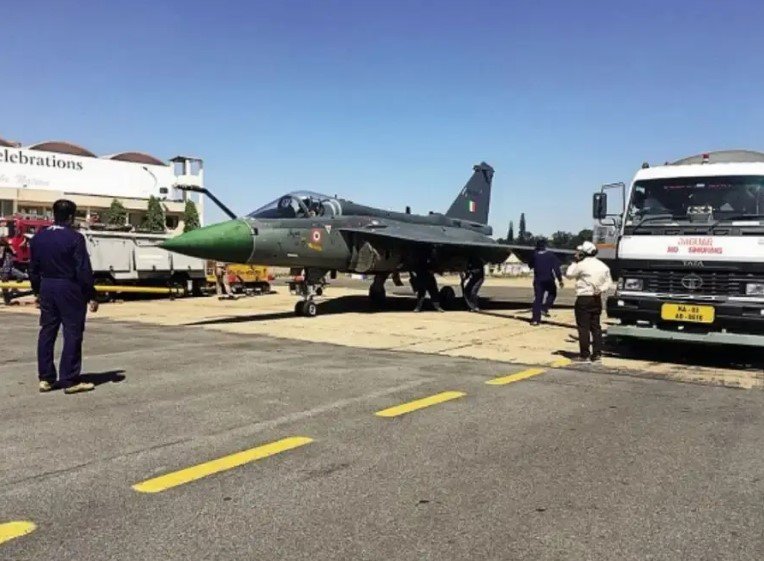Shares of Hindustan Aeronautics Ltd. (HAL) took a dip in early trade on Monday, but investor attention remains glued to the defence giant after it posted a mixed Q4 earnings report. Despite a year-on-year drop in profit and revenue, analysts aren’t backing off — in fact, some have doubled down on their bullish stance. What’s behind the optimism?
Profit Dips, But Long-Term Picture Still Strong
HAL reported a consolidated profit of ₹3,977 crore for the quarter ended March 31, 2025 — down nearly 8% from ₹4,309 crore in the same period last year. That slide was largely pinned on delayed deliveries of the Tejas Mk 1A fighter aircraft, a setback that had been telegraphed by analysts ahead of time.
Revenue, too, saw a decline — falling 7.2% to ₹13,700 crore. That’s a noticeable hit. But is it worrying in the bigger scheme of things? Most brokerages say no.
In fact, they’re calling this more of a timing issue than a structural one.
Brokerages Keep Faith Despite Blip
Several brokerages have reiterated their “Buy” ratings on HAL, with some even raising their price targets. Their reasoning? The orderbook. And it’s massive.
One small miss in quarterly earnings hasn’t shaken their belief.
Here’s a quick glance at some brokerage views:
-
Jefferies: Maintained “Buy” with a price target of ₹6,200.
-
Nomura: Target at ₹5,850, citing confidence in execution and visibility.
-
ICICI Securities: Sees strong long-term potential, retains bullish view.
That confidence is rooted in HAL’s future, not its Q4 past.

Orderbook Explosion is the Real Headline
The real story here isn’t the Q4 miss — it’s the ₹1.89 lakh crore orderbook HAL is now sitting on. That’s almost double what it had just a year ago. And it’s not just paper — the orders are from the Indian Air Force and Navy, with delivery timelines that stretch deep into this decade.
Some headline contracts in the pipeline include:
-
97 Tejas Mk 1A jets
-
143 Advanced Light Helicopters (ALH)
-
10 Dornier aircraft
Together, that’s ₹1.25 lakh crore worth of inflows tied to just three programs.
And yes, delays hurt — but these aren’t cancellations. Production hiccups are frustrating, sure, but they’re temporary. The demand itself is rock solid.
Stock Takes a Breather After Stellar Run
As of 11:11 AM on Monday, HAL shares were trading at ₹5,061.70 — down 1.29% for the day. The intraday low was ₹4,972 and the high touched ₹5,157.90. After months of relentless upward momentum, the stock seems to be taking a breather.
It’s worth noting HAL has surged over 140% in the past 12 months. A correction — even a minor one — was probably overdue.
One-liner here for rhythm.
But what now? Is there more room to run, or has the stock topped out?
Capex Plans Signal Long-Term Commitment
HAL isn’t just resting on past glory. The company has lined up a major capital expenditure (capex) program for the next five years, signaling intent to ramp up production capacity and modernize infrastructure.
This is key. Analysts believe this kind of reinvestment is essential for meeting delivery timelines and boosting margins.
Let’s take a look at what HAL’s capex plans look like:
| Year | Planned Capex (in ₹ crore) | Focus Areas |
|---|---|---|
| 2025 | 2,000 | Engine assembly, R&D facilities |
| 2026 | 2,500 | Manufacturing automation, AI tooling |
| 2027 | 3,000 | Naval platforms, helicopter units |
| 2028 | 3,200 | Sustainment support, software upgrades |
| 2029 | 3,500 | New plant setups in tier-2 cities |
HAL’s roadmap here is aggressive — and necessary. If it delivers, the company could not only meet its current commitments but also scale faster than competitors.
Should You Buy, Hold or Exit?
If you already own HAL, the temptation to book profits after a massive run-up is understandable. But analysts warn against panic-selling, especially with institutional sentiment holding firm.
Retail investors wondering whether to jump in now face a tougher call. The stock isn’t cheap anymore — and the short-term outlook could remain choppy until supply bottlenecks ease.
Still, HAL is one of the few large-cap plays in India’s defence sector with visibility, government backing, and technological credibility.
Quick takeaway for investors:
-
Buy: If you have a 3-5 year horizon and believe in India’s defence push.
-
Hold: If you’re already in and have seen big gains — the story’s not over.
-
Avoid fresh entry: If you’re looking for quick returns, the near-term may be volatile.
Defence Sector Sentiment Lifting All Boats
HAL’s earnings come at a time when India’s defence sector is buzzing. Government push for indigenisation, rising geopolitical tensions, and Make-in-India tailwinds have turned defence from a niche play into a mainstream theme.
Defence PSUs like Bharat Electronics, Mazagon Dock, and Cochin Shipyard are all seeing a surge in investor interest.
HAL, though, remains the bellwether. It’s the one stock that every defence-focused mutual fund and portfolio manager is tracking — and betting on.
